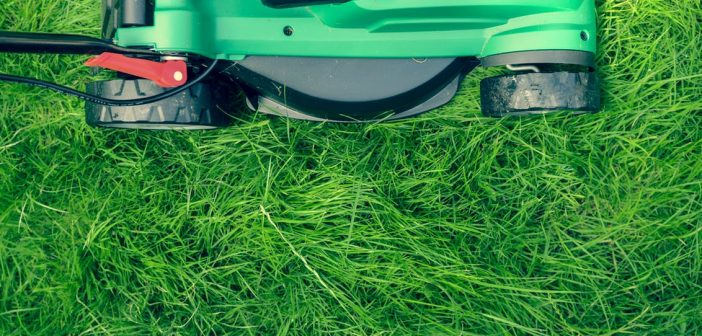Showing your lawn a little love and care doesn’t have to be difficult and time-consuming. You just need to know what can easily damage it. Here is a list of eight common things that can lead to lawn damage that you can avoid.

1. Dog Urine
Your little best friend might be killing your grass with their daily outdoor restroom breaks. Even if you don’t have a dog, a neighbor’s dog may be passing by and urinating on your lawn. The damage isn’t limited to just dog urine, common culprits include cat urine and bird feces. The concentrated nitrogen can kill patches of your grass. To reduce damage, you can quickly water down these areas to dilute the nitrogen in the urine. If your neighbor’s dog is making daily visits to your lawn for restroom breaks, consider installing a fence or talk to your neighbor about their dog. A small fence would be a beneficial alternative because they can keep other dogs and cats out of your lawn.
2. Scalping
Scalping is when you set your lawn mower blades on a setting too close to the soil. You may be trimming off more than your grass can handle. Raise your lawn mower settings a bit to prevent the mower from cutting too close. If you cut the grass too short, they will not be able to support themselves for growth in the future.
3. Dull Lawn Mower Blades
Dull lawn mower blades can be a surprising cause of your dead lawn. Dull blades tear into your grass rather than cleanly trim it off. You can reduce this damage to your grass by gradually checking if your mower is performing well with clean cuts. Discolored spots and jagged cuts are the telltale signs of dull mowing blades. Sharpen or replace your lawn mower blades every alternating season to ensure you aren’t mowing the lawn with dulling blades. Each lawn mower comes with a set of instructions on how to replace or sharpen the blades without damaging your lawn mower.
4. Amount of Watering
Be sure to always check with city ordinances in regards to watering your lawn and always follow the policies listed. There may be certain restrictions in place keeping you from overwatering your lawn. You may accidentally be killing your lawn by under or overwatering it. If your lawn is dry and straw-like then it isn’t being fed enough water. Reduce the amount of water your lawn needs by watering it during the early morning hours so the heat and the sun don’t evaporate parts of it. If your lawn is dying after pumping large amounts of water into it, then chances are you are overwatering it and drowning it. Limit yourself to watering it a moderate amount one a day, just enough to moisten the soil in a healthy amount. Don’t wait until there is an inch above the soil to stop watering it.
5. Foot Traffic
If you don’t have a walkway or fence installed on your lawn, then guests and pedestrians may be taking shortcuts across it. Reduce the amount of time people spend walking around your lawn by installing a walkway or stepping stones, a fence, or erecting a sign asking people to be mindful of your grass. In areas that have been heavily walked on, it is advised that you alleviate the compacted soil and reseed the patches.
6. Pesticide or Fertilizer
Not every garden pest is detrimental to your garden. The same advice can also be used for fertilizer. You may be pumping too much pesticide into your lawn or adding the incorrect fertilizer for your type of grass. Don’t worry about killing every single bug or pest you find in your garden. Tone down the amount of chemicals and pesticides you use on your garden and only utilize them when absolutely necessary. Check what kind of fertilizer you are adding to your lawn and ensure it is use-specific for your type of grass. Using incorrect types of fertilizer can add nutrients and minerals in concentrations above what your gardens needs, damaging it or smothering it further. A good fertilizer provides balance and support for your lawn, rather than trying to cram an overabundance of nutrients.

7. Insects
If you have never used pesticides on your garden or lawn before, then you are letting harmful insects and pests roam free. Most insects don’t cause any detrimental effects to your lawn. Some insects can even have beneficial side effects, but those are rare. Most are pests that eat your lawn or hog the nutrients available to your grass. Don’t set out to kill every single insect you find in your garden with harsh waves of pesticides. Instead, use a gentle pesticide to get rid of any excessive amount of insects eating your lawn.
8. Thatch
Thatch is another lawn mowing mistake commonly overlooked. Thatch are patches of cut and decaying grass blades that weren’t picked up and have been stamped down into the intact and healthy grass, choking it out. It may be difficult to spot thatch on the grass at first and it is often discovered after it is too late. To ensure thatch isn’t damaging your grass, remove it by passing over with a rake after you are done mowing it. Don’t worry about picking up every cut blade of grass, as small amounts of it can be used a fertilizer for your lawn. Leave some of it in, but don’t allow large patches of it laying around in excess.
After avoiding the common mistakes found on this list, you may find yourself with healthy and recovering lawn. Don’t overlook them or pass them off as harmless stuff, as they are most likely the culprit damaging and killing your lawn.








